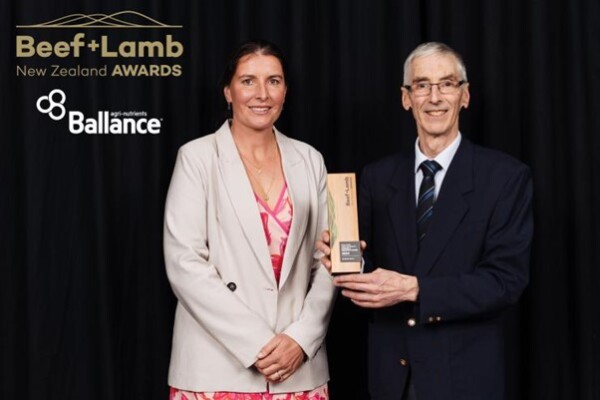Congratulations to AgResearch Senior Scientist David Hume, the winner of the Ballance Science and Research Award at the Beef+LambNZ Awards in October 2024. The award recognises excellence in science and research activities that are of direct relevance and benefit to the sheep and beef sector. Specifically, it recognises David’s work associated with the development and commercialisation of the novel endophyte, AR37.

David (R) recieving the award from Dani Darke, farmer and Director at Ballance Agri-Nutrients.
The development of AR37 provides ryegrass with improved agronomic performance, insect protection and plant persistence, with few adverse animal health effects compared with standard endophytes. The commercialisation of AR37 in a wide range of ryegrass cultivars has led to greater productivity and persistence of pastures, resulting in increased animal productivity. In a 2017 report to MBIE, ACIL Allen Consulting estimated that in the use of AR37 endophyte will have contributed NZ$3.6 billion to the New Zealand economy by 2023.
Background:
Perennial ryegrass and their associated endophytes, form the backbone of NZ’s pastoral feed base. Ryegrass is estimated to be the most economically valuable plant species in NZ.
This is not surprising considering that NZ’s livestock grazing system is entirely reliant on ryegrass with their associated endophytes for their ability to withstand both endemic and introduced pasture pests. The mutualistic relationship between ryegrass and Epichloë fungal endophytes are essential for protecting host plants from insect pest herbivory. This protection is achieved via the production of endophyte-derived secondary metabolites, most notably several alkaloidal compounds. The scientific challenge has been to identify and commercialise selected Epichloë strains that can simultaneously provide protection against insect pests, ensuring ryegrass persistence, while not causing animal health and welfare issues. Some of the compounds produced by Epichloë are responsible for animal health problems that can reduce the amount of meat and milk produced by grazing animals.
After investing in the development of AR37, Grasslanz Technology made the innovation available to New Zealand and overseas farmers by licensing it to seed companies including PGG Wrightson Seeds.
Congratulations David !
David (L) with Russell Croy at the AgResearch Lincoln Research Farm